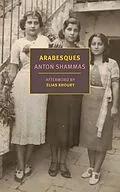A luminous, inventive, and deeply personal exploration of living in the liminal space between Jewish and Arab, ancient and modern, by a gifted Palestinian writer.
Arabesques was a literary and political astonishment when it first came out in 1986, a book that showed how sophisticated fiction could engage the urgent political issues of the day not as propaganda but as and through the imaginative and linguistic means of literature itself. The astonishment began with the language in which the book was written. Anton Shammas, from a Palestinian Christian family and raised in Israel, wrote his novel in Hebrew, as no Arab novel had been before, a choice that was provocative to both Arab and Jewish readers. The novel is written in an elegant and elaborate style, alive with echoes, and is divided into two sections: "The Tale" and "The Teller." "The Tale" tells of several generations of family life in a rural village, of the interplay of past and present, of how memory intersects with history in a part of the world where different people have both lived together and struggled against each other for centuries. "The Teller" is about the writer's voyage out of that world to Paris and the United States, as he comes into his vocation as a writer, and raises questions of the authority of the storyteller and the nature of the self that have come to preoccupy so many writers. Shammas's tour de force is both a personal and a political narrative, as well as a reinvention of the novel as a way of envisioning and responding to historical and cultural legacies and conflicts.
Autorentext
Anton Shammas (b. 1950) is a Palestinian writer and translator of Arabic, Hebrew, and English. His novel Arabesques, originally published in Hebrew in 1986 and translated into nine languages, was chosen by The New York Times Book Review as one of the best seven works of fiction of 1988. A professor emeritus of comparative literature and Middle East studies at the University of Michigan, Ann Arbor, Shammas's essays have been published in Harper's, The New York Times Magazine, Critical Inquiry, and The New York Review of Books.
Vivian Eden is an American poet and translator who lives in Jerusalem and works on the staff of Haaretz.
Elias Khoury is a literary critic, novelist, editor, playwright, activist and public intellectual. The author of twelve novels, Khoury's work has been translated into numerous languages, and he is considered one of the foremost novelists writing in Arabic today.
